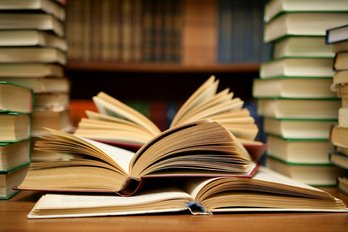
I was the Instructor of Record for ENGL 1100 in Fall 2013, Spring 2014, Spring 2015, and Spring 2017. I have taken several approaches to teaching this course, but always emphasize the skills necessary for literary analysis and research and writing literary arguments.
Course Description and Objectives
Undergraduate Catalog Description: This course is an introduction to the study of literature, aimed at developing abilities to read literature and write about it with skill, sensitivity, and care. Students will read poetry, drama, and prose fiction, and through the writing of several papers will be introduced to terms and methods of formal study of literature. Course required for entry into most upper-level English courses.
My version of this course focuses on the interpretation and analysis of literature, with a particular focus on learning how to write literary analytical papers, including those based on close reading, use of reference materials, and engagement with secondary critical sources. Thus, this course should teach transferable skills such as performing analysis, constructing an argument, critical thinking, reading and engaging with scholarly writing, and developing your own voice as part of this scholarly conversation, which are valuable skills regardless of major. Below are details from a selection of my sections.
Course Description and Objectives
Undergraduate Catalog Description: This course is an introduction to the study of literature, aimed at developing abilities to read literature and write about it with skill, sensitivity, and care. Students will read poetry, drama, and prose fiction, and through the writing of several papers will be introduced to terms and methods of formal study of literature. Course required for entry into most upper-level English courses.
My version of this course focuses on the interpretation and analysis of literature, with a particular focus on learning how to write literary analytical papers, including those based on close reading, use of reference materials, and engagement with secondary critical sources. Thus, this course should teach transferable skills such as performing analysis, constructing an argument, critical thinking, reading and engaging with scholarly writing, and developing your own voice as part of this scholarly conversation, which are valuable skills regardless of major. Below are details from a selection of my sections.
Sample Lesson: Reading and Arguing in Literary Analysis
In ENGL 1100, I believe that a basic skill that must be practiced at the beginning of the semester is reading for literary analysis, and understanding that there are different ways of reading and taking notes on a literary work. A set of three classes at the beginning of the semester has students practice these different ways of reading on one text (Charlotte Perkins Gilman's "The Yellow Wallpaper") and leads students to crafting an argumentative thesis about the text by the end of the lesson.
Day One:
Reading:
- "The Yellow Wallpaper," Charlotte Perkins Gilman
- "Chapter 2: Research Within the Text" from Writing Essays About Literature, Katherine O. Acheson from Broadview Press
Homework (to be completed before class:
- Close Reading Reading Note (developed from Writing Essays About Literature)
- Annotations on "The Yellow Wallpaper" handout
Activity:
- I divide students into groups of 5 or 6 and ask the groups to compare reading notes and decide on a summary of notes and evidence to list, with quotations.
- After students come up with their summary and quotations, they list topics that the evidence fits under (i.e. women's roles, medicine, mental health, setting, character, etc.).
- I give the groups large pieces of paper and markers and they make charts in which to organize their evidence (the topics they came up with along the top, with relevant evidence listed below).
- By the end of the group work, I ask groups to formulate a few sentences about what they've noticed in terms of their evidence and topics, and to finally come up with a very tentative thesis statement based on the work they've done during class.
- Students should share their work with the class.
Day Two:
Reading:
- "Chapter 3: Using Reference Works" and "Chapter 4: Research about Social and Historical Contexts" from Writing Essays About Literature
- "From 'Why I Wrote "The Yellow Wallpaper,"'" Charlotte Perkins Gilman
- Review "The Yellow Wallpaper"
Homework (to be completed before class):
- Research and Reference Reading Note (developed from Writing Essays About Literature)
Activity:
- Students should repeat the same activity as on the first day, in the same groups, adding new evidence from this second type of reading and note taking to their existing charts.
- By the end of the lesson, groups should revise their thesis statement to take into account the work they've done during the second lesson.
- Students should share their work with the class.
- At the end of the class, pass out a variety of critical articles on "The Yellow Wallpaper." Each group should have students reading each of the articles so that the group will get a variety of critical perspectives during the next class.
Day Three:
Reading:
- "Chapter 5: Research About the Current Critical Assessment of Literary Works" and "Chapter 6: Inventing Your Argument" from Writing Essays About Literature
- Assigned critical reading
- Review "The Yellow Wallpaper"
Homework (to be completed before class):
- Secondary Source Reading Note (developed from Writing Essays About Literature)
Activity:
- Students should get back into their same groups. Each student should briefly explain the argument of their assigned essay.
- As a group, students should consider how each article would support their existing arguments and thesis statements about "The Yellow Wallpaper."
- Students should update their charts once more, adding article titles under each topic they think the article would support, with page numbers of especially relevant quotations from the article.
- By the end of the activity, students should revise their thesis statement a final time.
- Students should share their work with the class: What is their final thesis statement? What are their topics (their "body paragraphs," if this were a paper)? What evidence would support each of those topics?
